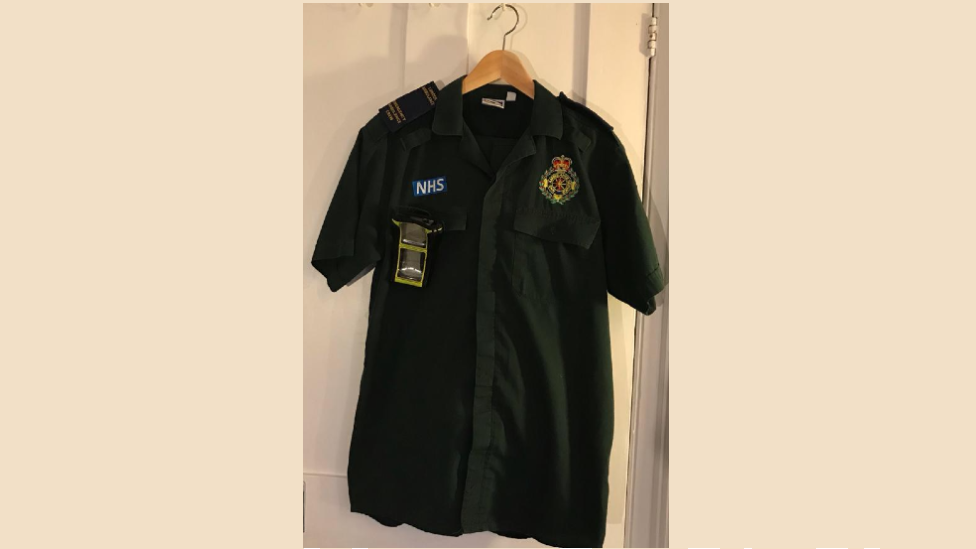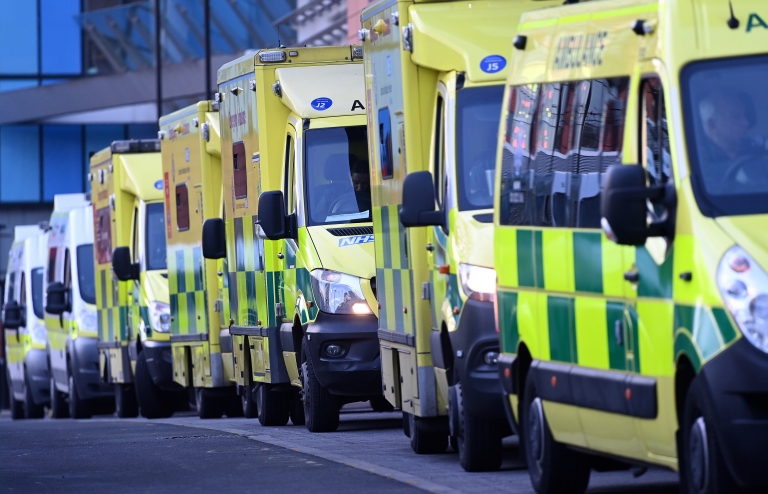Nidge
Postman
- Joined
- Aug 14, 2013
- Messages
- 304
the first bit of news I was interested in by the BBC the poor lass is only an EAC as well Jesus....
I've worked throughout the pandemic. Up until now, it's felt manageable and I was optimistic the NHS could cope. But with the surge in cases this week, the gravity of the situation really hit home. The NHS already feels at breaking point. For the first time, I'm not sure we will be able to treat everyone who needs it.
Up until December, I was typically seeing perhaps one or two Covid patients per 12-hour ambulance shift - the rest could be elderly fallers, people who have had fits, people experiencing a mental health crisis, that kind of thing. This started changing as the new variant emerged and infections accelerated.
In the last four days pretty much all my patients have been Covid patients, give or take a couple of exceptions. What's been striking is that we'll turn up to see one person and find that literally everyone else in the family is infected, too. That wasn't happening before.
In this part of London there are many intergenerational Bangladeshi families living together, so that might be a family of eight or more all infected with the virus. It's affecting all types of communities, but some are being particularly hard hit.
Often when we arrive the patients look terrified and are breathing so fast, they are gasping and simply unable to speak. Relatives tell me they wanted to call an ambulance earlier, but the patient was too scared of going to hospital.
They tell us they know too many people from their communities who went into hospital with Covid and never came back. Sometimes people are in denial that they have the disease, even with the classic symptoms of breathing difficulties, a cough, and loss of taste or smell. I'm not sure why. Perhaps it's a combination of fear or shame, or perhaps it's the influence of the conspiracy theorists telling people Covid doesn't exist.

I have to turn off my emotions, concentrate on what needs to be done, and not look too much at the family's anguished faces as I shut the doors
For elderly frail people with comorbidities like dementia, diabetes or advanced cancer, we know their chances of recovering are slimmer. It feels wrong in so many ways taking them away from their families; they may well die in hospital and never see them again. But unless a palliative care plan has been made for the patient to stay at home, which they have agreed to whilst they still have mental capacity, we don't have much option but to take them to hospital.
Sometimes we've had 10 or more family members clambering onto the ambulance to say their goodbyes. Naturally, they want to kiss or hug their loved one. Yet there is a huge infection risk.
My medical head says we need to go now; the patient is critically ill and I don't want them to decline further and go into respiratory arrest. But it feels desperately brutal telling their loved ones they must say goodbye. I have to turn off my emotions, concentrate on what needs to be done, and not look too much at the family's anguished faces as I shut the doors.
This week I've treated several younger, fitter patients too, including a young white guy in his late 30s with children under five. He seemed shocked and panicked, telling me he's never ill, he runs regularly and cycles to work, but has felt simply wretched since coming down with Covid over Christmas.
'He feels like he's dying'
As we did his checks, he became tearful telling me he feels like he's dying. In his case, his oxygen SATs (saturation level) are still within normal range, albeit on the lower end. He's not sick enough to warrant hospital and I know if we take him in it's simply putting extra strain on already-stretched resources and he'll be discharged. So we leave him home with advice on what to do if his condition worsens and reassurance that he can call us back any time.
A woman we see later in the week is quietly stoical and initially seems not too poorly, or not "big sick" as we say in the trade. But after we check her SATs we find she has silent hypoxia, meaning her oxygen level is already dangerously low (around 70% - normal is 94-98%).
It is "silent" because she is not experiencing the shortness of breath which might have alerted her or family sooner. She is 50, slim, leads an active life and does not fit the profile of those we might expect to become critically ill. We give her high-flow oxygen, grab a bag for her purse, phone and charger and she's being wheeled out of her home within 10 minutes. Even though her English is poor, we're unable to bring her daughter to translate because the hospitals can't cope with the extra people and the infection risk.
En route, other than giving oxygen, stroking their hands and telling them we're here to look after them, there's little we can do to treat patients. The best place for them is hospital, where there are more options - including drugs like dexamethasone - and the medical teams are now experts having dealt with hundreds, if not thousands, of patients.

EPA
Even resuscitation patients, who are the sickest, have to sometimes wait on ambulances, as staff scramble to free up beds. I've never seen this happen before
We take patients to hospitals across east and north London. For the last couple of weeks all these hospitals have been breaching, day after day, meaning their emergency departments are effectively full and patients have to wait in ambulances or divert to the next nearest hospital.
We get messages telling us which hospitals to avoid. Sometimes it feels like dominoes with one hospital falling after another and I'm wondering if we'll be sent out of London soon.
The longest wait I've had to hand over a patient at hospital is three hours, but there have been longer. Not only is this distressing for our patients on board, but it's also tying up our ambulances for hours at a time.
This obviously leads to delays in our response times. We are also seriously understaffed with so many of our own people off sick or isolating. We have the fire brigade helping us already, as well as St John Ambulance volunteers, and I hear the police will be joining us, too, soon.
Even resuscitation patients, who are the sickest, have to sometimes wait on ambulances, as staff scramble to free up beds. I've never seen this happen before.
'Cracks have been showing'
In these cases, we update the staff regularly on the patient's condition and if they show signs of deterioration, they will find them a place. Hospitals are adapting constantly, introducing new systems, repurposing wards and spaces into Covid wards, building isolation pods and bringing in staff from other areas of the hospitals to help.
With the less seriously ill patients, we are being encouraged to call ahead and discuss them with consultants who can sometimes offer alternatives to them being admitted - such as being assessed by an initial video call, having daily phone calls, and with home monitoring kits that include SATs monitors.
I'm amazed at how upbeat and professional the hospital staff are, although this week the cracks have been showing with nurses and consultants looking worn out and stressed, and occasionally snapping at us.
Mainly though we're all pulling together and despite the stresses and relentlessness of this pandemic, I'm glad I'm here helping, at the eye of the storm as it were. I feel privileged to be doing something useful during this time.
Francesca's name and some patients' details have been changed or removed to protect their anonymity. This article refers to Francesca's shifts last week.
I feel for you mate, I work in Theaters in Mid Essex our work has dropped off the edge of a cliff. The only operations we are doing is Trauma. We have 16 operating theaters and all but one is closed. At the end of all of this we have got to try and recover our numbers













